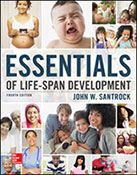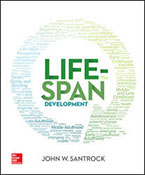A Conversation with Life-Span Development Author John Santrock
Listen in to this Conversation with Life-Span Development Author John Santrock
Published August 17, 2015
You've become a household name in the developmental psych community. But how did you start writing? What was your initial inspiration when writing the first few editions?
John Santrock: Child Development was my first title. I really had never thought about writing an undergraduate text when I got a call from Steve Yussen, my former office mate at the U. of Minnesota. Steve had become a faculty member at the U. of Wisconsin and I was teaching at the U. of Georgia. Steve wanted to write a child development and education title, so we joined forces and wrote Child Development. Both of us had remembered rather boring books from our undergraduate days, so we made a commitment from the start to not only present the latest, highest quality of research in different areas, but to also provide extensive real-world applications of concepts in the text.
The book was successful, and several years later, the publisher asked me to write an adolescence text. My youngest daughter, Tracy, was 11 at the time and starting to engage in some “adolescent" behaviors I didn't understand. At the time, the field of adolescence was very young and far less research was being conducted on the topic than in the field of child development. Before I wrote the book, I taught the undergraduate course in adolescence several times, and have continued to teach it every year since. Writing the book and teaching the course were helpful in better understanding my daughters as they went through adolescence.
 After Adolescence was published, I moved on to be a professor at the University of Texas at Dallas. We did not have a life-span development course there, as was the case then in many colleges and universities. So, I created the course in the early 80s, very much enjoyed teaching it, and along the way, decided to go ahead and write Life-Span Development. I continue to teach life-span development every semester and love teaching the course.
After Adolescence was published, I moved on to be a professor at the University of Texas at Dallas. We did not have a life-span development course there, as was the case then in many colleges and universities. So, I created the course in the early 80s, very much enjoyed teaching it, and along the way, decided to go ahead and write Life-Span Development. I continue to teach life-span development every semester and love teaching the course.
How has the field of developmental psychology evolved since you started writing?
Santrock: The field is certainly becoming much more complex, diverse, and mature than when I began writing textbooks. When I wrote the first editions of my titles there were only a handful of research journals, almost all of the research was being conducted in the United States, and there were only a few longitudinal studies underway. Today, there are a huge number of research journals, researchers from around the world are advancing our field, and there are many longitudinal studies underway. Early in the field, researchers almost exclusively studied one domain—such as biological processes—but today we have far more research going on that includes connections across domains. Also, as the number of quality research studies has increased dramatically in recent years, we are making good progress in refining our knowledge in many areas of development.
What areas of research are you most interested in and excited about?
Santrock: There are many fascinating research areas in our field, and the increasing breadth, depth, and pace of the research is remarkable. In terms of biological processes, understanding how the brain develops, emergence of the fields of developmental cognitive and developmental social neuroscience, and the intense effort to uncover epigenetic linkages are key developments. Recent research on autism and ADHD, and ways to help children with such disorders, is becoming more sophisticated. In terms of cognitive processes, links between the development of the brain and various cognitive processes such as attention, memory, and executive function provide valuable information. The recent interest in the development of executive function and its components is expanding, and the role of mindfulness and how it can be trained is exciting. Research on slowing the cognitive decline that characterizes aging and ways to improve the lives of individuals with various diseases, such as Alzheimer disease, are much needed.
 In terms of socioemotional processes, the much-expanding interest in conducting longitudinal studies to discover developmental pathways that connect various experiences at different points in development—to determine risk factors that predict developmental outcomes—is valuable. For many years, we only studied attachment in infancy. The increasing interest in exploring the importance of attachment later in development is helpful. Determining what constitutes successful aging and how to convert a world built for the young are key aspects of improving society, and they are starting to get attention—and deserve more.
In terms of socioemotional processes, the much-expanding interest in conducting longitudinal studies to discover developmental pathways that connect various experiences at different points in development—to determine risk factors that predict developmental outcomes—is valuable. For many years, we only studied attachment in infancy. The increasing interest in exploring the importance of attachment later in development is helpful. Determining what constitutes successful aging and how to convert a world built for the young are key aspects of improving society, and they are starting to get attention—and deserve more.
How have your teaching experiences impacted your work as an author and vice versa?
Santrock: Being in the classroom on a regular basis plays a very important role in my writing. I've taught at least two undergraduate classes a semester since I finished my Ph.D. at the U. of Minnesota. Teaching undergraduate developmental psychology classes especially provides feedback from students about what the most difficult topics are for them, forces you to provide examples of concepts, and keeps you from being too abstract in the way you present material.
Writing and revising content requires you to be very up-to-date on the most recent developments in your field, and students appreciate the current content and applications you can provide. Every semester, I revise and update my lectures in child development, adolescence, and life-span development with recent research I've read about and will include in the next editions of my books.
John Santrock, Professor of Psychology at the University of Texas at Dallas, is the author of several bestselling human development programs, including Life-Span Development, Essentials of Life-Span Development, Children, and Adolescence. As a master teacher, Santrock connects students to current research and real world application. His integrated, personalized learning programs give students the insight they need to study smarter and improve performance.

